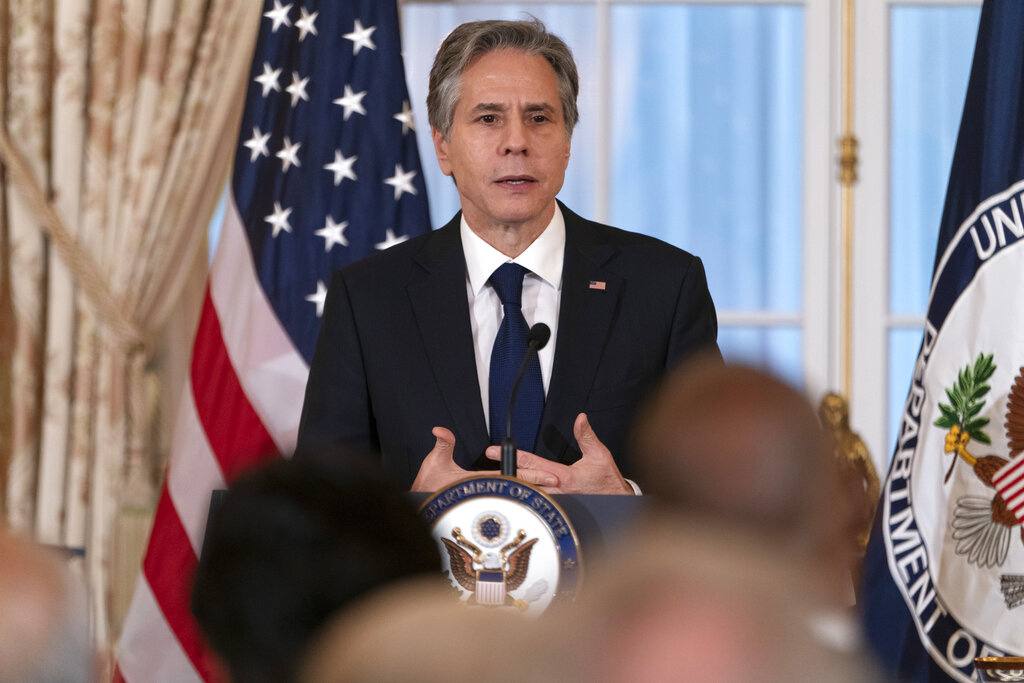Beijing (People’s Daily) - US State Secretary Antony Blinken delivered a long-awaited formal China strategy in a speech in Washington on Thursday. Unlike his predecessor’s Cold War slogan, Blinken disguises US intent for great power competition with delicately chosen words, experts told the People’s Daily.

Secretary of State Antony Blinken speaks during a reception celebrating Eid, Thursday, May 26, 2022, at the State Department in Washington. (Photo: AP)
In the speech, Blinken reiterated pledges that the US is not looking for a new Cold War or conflict with China and the commitment to the “one China policy.”
The US chief diplomat depicted China as the most serious and long-term challenge to the world order. He laid out a threefold strategy of investing at home, aligning with allies and partners and competing with China, asserting the Biden Administration will work together with Beijing where their interests overlap.
“The speech made by US Secretary Antony Blinken, although fluent and brain-racking, is in essence spreading disinformation, hyping the ‘China Threat’ theory, interfering in the domestic affairs of China and smearing China’s domestic and international policies,” said Chinese foreign ministry spokesperson Wang Wenbin on Friday.
“Its goal is to contain and suppress the development of China and defend US hegemony, which China is strongly dissatisfied with and resolutely opposes,” said Wang. He also warned that the US will not fix its own problems by hyping the “China Threat” theory, but plunge the world into the abyss of danger.
Blinken’s “no Cold War” promise appears to increase the room for cooperation but China should be cautious because of US previous walk-backs on crucial policies, said Wang Yong, a professor at School of International Relations at Peking University.
During his visit to Asia, US President Joe Biden vowed to “defend” Taiwan if it is under attack from the Chinese mainland, undercutting the traditional position of the “strategic ambiguity” over the island. Biden shortly changed the tone, saying his comments don’t reflect a policy shift.
The “invest, align and compete” strategy does not mean to replace the earlier “3C” policy - “competition, confrontation, cooperation,” but instead highlights “competition” in that, said Diao Daming, an associate professor of School of International Studies, Renmin University of China. “Investing at home and aligning with allies serve the goal of competition.”
If such competition is entirely driven by US interests, it is highly likely to slide into confrontation, said Diao.
The address still embodies strong ideological antagonism towards China, and hyped many issues to smear and divide China, Diao said.
Although there are some seemingly “soft” rhetoric towards China in Blinken’s speech, such as “to coexist and cooperate” for the two countries, the fact is the US often seeks to take the moral high ground and in return blames China for an unsatisfactory state of the bilateral relations relations, added Diao.
“Some of the remarks whitewash the US’ intent for ‘great power competition’ and the ‘Indo-Pacific strategy,’” the expert said.
The outcomes of Biden’s high profile Asia trip also demonstrate the complexity of aligning allies and partners to compete with China, Wang added.
Biden this week unveiled the Indo-Pacific Economic Framework for Prosperity (IPEF) to fill the gaps in US economic engagement with Asia and Pacific region. Although 12 Asian countries joined the pact, most of the signatories said the IPEF should be open and not used as a counterbalance to China.
Biden’s visit to Asia seemed to have harvested some countries’ interest in the IPEF, but the economic initiative is still vague, with its operability and appeal in question, said Diao. China should remain its composure and confidence in engaging with the region.


